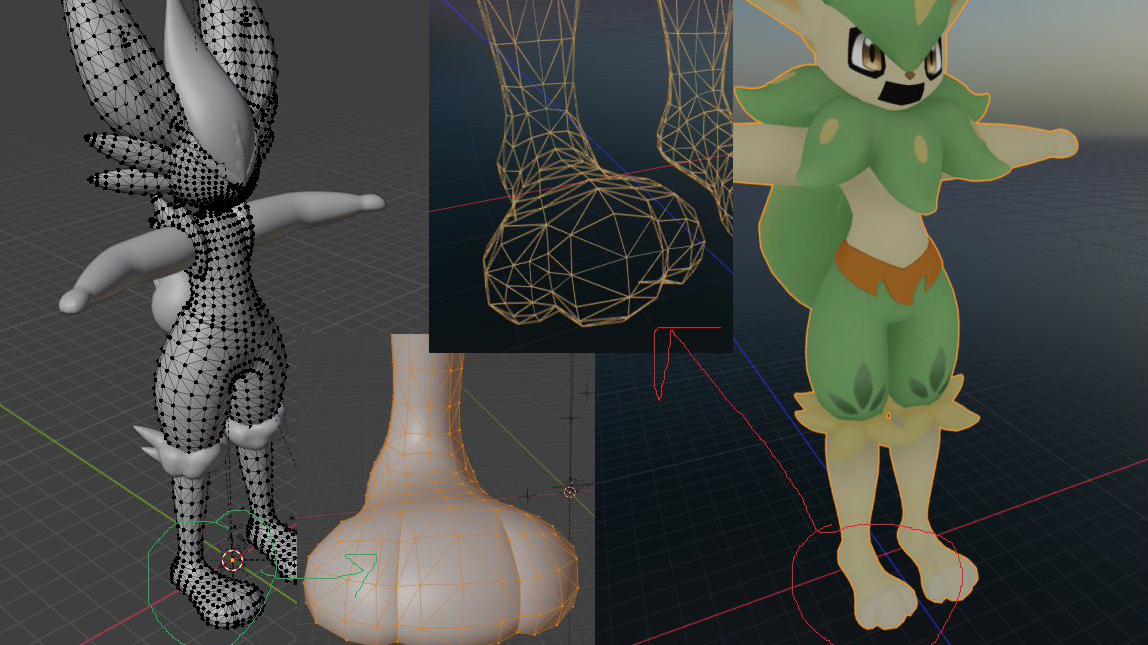Ludicrously successful Pokémon parody survival game Palworld, which has sold four million copies in just days, has come under the microscopes of internet detectives who think its 100 Pokémon-like monsters go beyond parody into straight-up rip-off territory.
The head of Palworld developer Pocketpair, Takuro Mizobe, said on X today that “slanderous” comments are being made about Palworld’s artists. Mizobe also recently told Automaton that Pocketpair has “no intention of infringing upon the intellectual property of other companies.”
The unproven allegation going around is that some number of Palworld’s creature models weren’t just inspired by Pokémon, but were made by directly copying and editing 3D models ripped from Pokémon games.
The criticism originated from an X user named byofrog, who says they’re motivated by disgust for “how much Palworld glorifies animal abuse” (the game includes a variety of ways to mistreat its creatures). In a series of posts byofrog points out similarities between ripped 3D meshes from Palworld and Pokémon games.
“The Palworld meshes are not node-for-node the same, but they’re really close,” byofrog wrote alongside a comparison of the Cinderace model ripped from Pokémon Sword and Shield and one of Palworld’s models, which in particular has very similar, but not identical, feet.
Byofrog says they have “very little” experience with 3D modeling, and others aren’t so convinced that any Pokémon meshes were directly copied. “It is my opinion, as someone with a background in 3D modeling, that not only is the palworld topography different, it is superior,” said X user Hexidimentional in response to one comparison.
Maybe they’re brothers? #Palworld #Pokemon #Lycanroc model from SV. pic.twitter.com/KnGSozfJGQJanuary 21, 2024
Byofrog’s most-shared comparison (embedded above) overlays Pokémon’s Lycanroc model on Palworld’s parody version, showing how the two creatures share almost identical proportions.
“To ‘accidentally’ create a complex model mesh with so near-exact proportions is practically impossible,” wrote former Blizzard designer Eric Covington (who is not a 3D artist) on X in a heavily-shared tweet. “To repeat that improbability throughout your roster… doesn’t pass the sniff test.”
An anonymous videogame character artist told VGC that the comparisons showed different models, but that the Palworld models may have been “built over the top of the Pokémon models” and that they wouldn’t be comfortable claiming them as original work.
現在、弊社のアーティストに対して誹謗中傷が届いており、殺害予告に近いようなツイートも散見されます。パルワールドに関して様々な意見を頂いておりますが、パルワールドに関する制作物の監修は全て私を含めた複数人で行っており、制作物の責任は私にあります。…January 22, 2024
In a recent blog post (machine translated from Japanese), Mizobe admitted to being in over his head when production of Palworld’s models and animations began. Pocketpair planned early on to make 100 monsters for the game, but didn’t know anything about rigging them for animation and its file management was a “mess.” However, according to Mizobe, everything changed after Pocketpair brought on a veteran animator who showed them their errors and set up “a mass production system.”
In the X post I previously referenced (also machine translated from Japanese), Mizobe described unspecified comments directed at Palworld’s artists as “slanderous” and said that they had received death threats.
“All productions related to Palworld are supervised by multiple people, including myself, and I am responsible for the production,” he added.
Mizobe may also be referring to claims that Palworld’s art was assisted by generative AI, which there’s no direct evidence to support—that claim is based on the developer previously having made a game centered around AI art generation.
The Pals’ similarities to Pokémon may turn out to be more controversial among gamers than lawyers in the end. The notoriously litigious Nintendo hasn’t made a move against Palworld at this time, and attorney Brandon Huffman of videogame-focused firm Odin Law and Media told Bloomberg today that he doubts Pocketpair needs to worry about it. Last week, we described the Pals as a “Frankenstein stitching” together of Pokémon pieces which creates a look particular to Palworld: “a surreal gallery of familiar eyes, limbs, and silhouettes.”
Had it achieved a regular level of success, the provenance of Palworld’s 3D models might never have come under so much scrutiny, but Palworld has been an absolute phenomenon, climbing over Counter-Strike 2 to become Steam’s most-played game by concurrents right now. Even though it’s certainly only borrowing CS2’s throne, that’s an incredible feat which has initiated a rush to understand its meaning. Is it a sad triumph for unoriginality and tastelessness, or a scrappy team’s heroic victory over fussy internet critics and tattletale Pokémon fans?
Personally, I think it’s something more mundane: further proof that PC gamers have zero defense against the allure of any new early access survival game.











